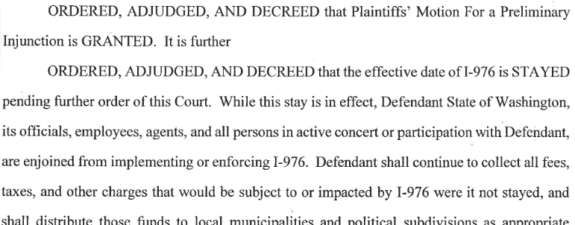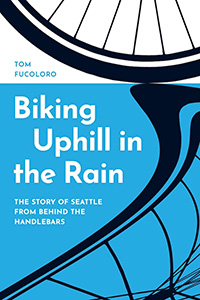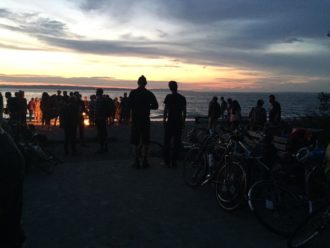
When news broke this morning that the court had granted an injunction delaying the effects of I-976 pending a final ruling on the initiative, there was a clear sense of relief among transportation advocates. Without an injunction, transportation agencies across the state would need to slash collection of vehicle license fees and motor vehicle excise taxes (“MVET”) starting December 5. That would have forced them to make massive decisions about their budgets in a very short period of time, a recipe for disaster.
But the final decision is still very unknown. Maybe the initiative is defeated in court and no budget changes will be necessary. Or maybe this injunction will simply be a short window of delay, and any qualifying fees collected will need to be refunded once the courts approve them.
Tim Eyman is sloppy and consistently writes misleading and shoddy initiatives that are illegal under the state’s constitution. I am no lawyer and have no special insight into the planned legal strategy beyond what has been reported elsewhere, but this initiative sure seems to break some of the laws regarding initiatives. For example, capping vehicle license fees and redefining how MVET should be calculated sure seem like two different things to me. It seems likely that many people (especially in Snohomish, Pierce and King Counties) voted for it because they were upset about Sound Transit’s car valuation calculations, but didn’t intend to also decimate transportation departments across the state that rely on the totally unrelated vehicle license fees. This is one reason why multiple-issue initiatives are and should be illegal. If it weren’t, an initiative writer could just package enough ideas together that most people will find at least something to vote for, resulting in a bunch of unpopular changes all becoming law together.
Others may have been mislead by the title into thinking the initiative would preserve any fees previously approved by voters, an argument the court found very compelling when granting the injunction:
King County judge has blocked implementation of I-976, saying the plaintiffs challenging the $30-tabs ballot measure are likely to win their case. Judge noted plaintiffs raised substantial concerns that the ballot title was misleading. Background: https://t.co/7n8TOJKJks pic.twitter.com/aBPZ3sOJYk
— Melissa Santos (@MelissaSantos1) November 27, 2019
I-976 passed by 6 points, or about 119,000 votes out of nearly 2 million cast. That’s not a blowout. Would a car tab initiative have passed without the MVET part? Or vice versa? Or if it was clear that voter-approved funding would be cut rather than exempted?
I-976 is objectively a pile of garbage. Like, even if you supported it, you gotta admit it was poorly written. But even if the courts throw the whole thing out, I’m not going to feel comfortable. This is a scrap over a single initiative, but Washington State has not yet found a pathway for addressing a much larger somewhat related vision: Taxing climate-destroying emissions to fund equitable and sustainable investments. If we could win such a vote, so many barriers to fighting climate change and funding sustainable transportation would disappear.
Though it was very different than I-976, 2018’s carbon tax initiative (I-1631) would have increased the cost of burning fossil fuels including gasoline in cars. That initiative failed by 13 points, or about 405,000 votes out of 3.1 million (mid-term turnout is much higher than off-year turnout). So we need something like a half million votes, and that’s going to take turning out new voters, bringing new communities into the fight and changing some people’s minds. And it’s going to require a popular movement that engages and inspires people far outside of the Seattle area.
No matter the final ruling, I am worried about the long-term implications of this I-976 court battle. Of course we need to win the case, but how would overturning the initiative affect statewide voter opinion of the Seattle area and any issues that Seattle is trying to lead? I would hope that people angry with Seattle for what appears on the surface as overturning the will of the people also reserve some anger for Eyman for wasting their time and energy by writing such a garbage initiative. But I don’t see a path forward in which everyone loves each other and feels good about the outcome.
State Democrats are going to need to demonstrate some incredible leadership this session and during the 2020 legislator and gubernatorial campaigns. Eyman dragged a wounded bull into the house and let it free. For some Republicans it’s probably pretty fun to watch Democrats deal with all the damage and bullshit, though I’m not sure I-976 really accomplishes great things for the party (the 16-year State transportation package that I-976 might destroy was created by a Republican-led Senate in 2015. Do Republicans really want to replace it with a Democrat-created package?). But one thing is certain: Even if we get the bull to go outside, this place is going to be a real mess for a while.










Comments
2 responses to “Eyman writes sloppy garbage initiatives, but we also need to find a path to statewide carbon-reduction votes”
I tend to be skeptical of large, complicated initiatives, in general. I was somewhat conflicted in the carbon tax measures on the ballot in 2016 and 2018. On the one hand, we need to get off fossil fuels. On the other hand, it is very difficult to understand the full implications of a large complicated initiative, like a carbon tax, and there’s a high likelihood of unintended consequences. In some ways, voting yes on I-732 (carbon tax=good) feels similar to voting yes on I-976 (car tabs=bad). Of course, the two measures are on opposite side of the ideological spectrum, but either way, you’re still trusting whoever wrote the initiative to get the details right, plus, any vote for *any* initiative supports the initiative process in general, leading to other initiatives in the future (e.g. I-976) you may disagree with.
In the end, I ended up voting no on I-732 in 2016, but switched to yes on I-1631 in 2018. The shift had nothing to do with the differences between the measures themselves, and everything to do with Trump being in the White House. With his overt policies of encouraging as much pollution as possible and pretending that global warming does not exist, I felt the need for the state of Washington to resist and say to the world that climate does exist, and needs to be fought, and that need ended up overriding everything else, unintended consequences be damned.
I still think getting initiatives passed here is too easy, and the requirements should be toughened, and this includes all initiatives, both left leaning and right leaning. I’m sure what exactly needs to be done. Maybe increases to the number of signatures, requiring a 60% supermajority to pass, or allowing initiatives only in presidential election years, so you can’t sneak something by on a low turnout. At a minimum, people should be able to challenge the constitutionality of an initiative before it even appears on the ballot, rather than trying to litigate it after the fact, leaving everybody in limbo.
I think we should just ditch initiatives. It’s the job of our politicians to pass laws. They should campaign on certain policies, and if they’re elected they should just pass the legislation themselves. The constituents can contact their legislators to express support or opposition to their policies.